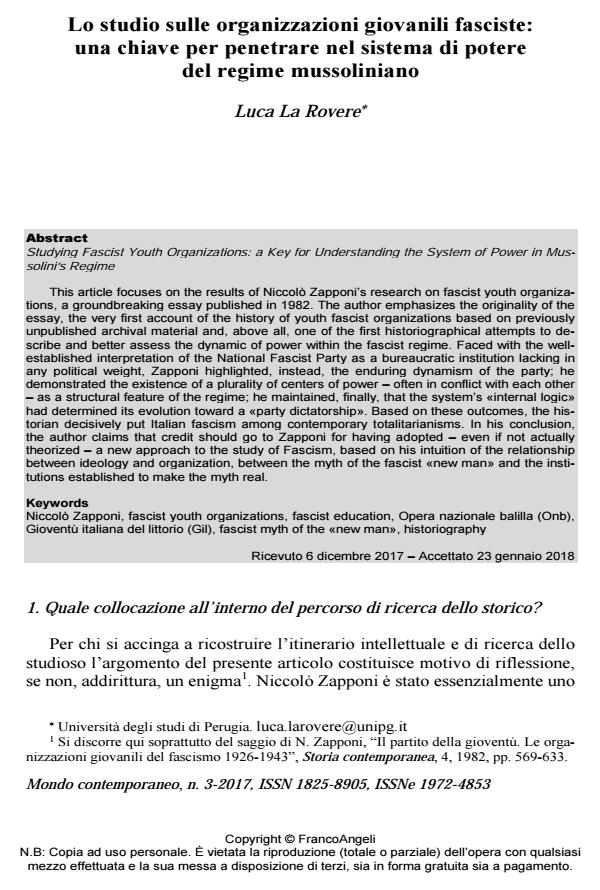Lo studio sulle organizzazioni giovanili fasciste: una chiave per penetrare nel sistema di potere del regime mussoliniano
Titolo Rivista MONDO CONTEMPORANEO
Autori/Curatori Luca La Rovere
Anno di pubblicazione 2018 Fascicolo 2017/3
Lingua Italiano Numero pagine 21 P. 57-77 Dimensione file 279 KB
DOI 10.3280/MON2017-003004
Il DOI è il codice a barre della proprietà intellettuale: per saperne di più
clicca qui
Qui sotto puoi vedere in anteprima la prima pagina di questo articolo.
Se questo articolo ti interessa, lo puoi acquistare (e scaricare in formato pdf) seguendo le facili indicazioni per acquistare il download credit. Acquista Download Credits per scaricare questo Articolo in formato PDF

FrancoAngeli è membro della Publishers International Linking Association, Inc (PILA)associazione indipendente e non profit per facilitare (attraverso i servizi tecnologici implementati da CrossRef.org) l’accesso degli studiosi ai contenuti digitali nelle pubblicazioni professionali e scientifiche
This article focuses on the results of Niccolò Zapponi’s research on fascist youth organizations, a groundbreaking essay published in 1982. The author emphasizes the originality of the essay, the very first account of the history of youth fascist organizations based on previously unpublished archival material and, above all, one of the first historiographical attempts to describe and better assess the dynamic of power within the fascist regime. Faced with the well-established interpretation of the National Fascist Party as a bureaucratic institution lacking in any political weight, Zapponi highlighted, instead, the enduring dynamism of the party; he demonstrated the existence of a plurality of centers of power - often in conflict with each other - as a structural feature of the regime; he maintained, finally, that the system’s «internal logic» had determined its evolution toward a «party dictatorship». Based on these outcomes, the historian decisively put Italian fascism among contemporary totalitarianisms. In his conclusion, the author claims that credit should go to Zapponi for having adopted - even if not actually theorized - a new approach to the study of Fascism, based on his intuition of the relationship between ideology and organization, between the myth of the fascist «new man» and the institutions established to make the myth real.
Parole chiave:Niccolò Zapponi, fascist youth organizations, fascist education, Opera nazionale balilla (Onb), Gioventù italiana del littorio (Gil), fascist myth of the «new man», historiography
Luca La Rovere, Lo studio sulle organizzazioni giovanili fasciste: una chiave per penetrare nel sistema di potere del regime mussoliniano in "MONDO CONTEMPORANEO" 3/2017, pp 57-77, DOI: 10.3280/MON2017-003004